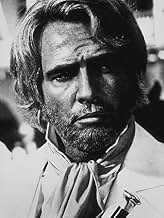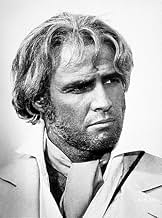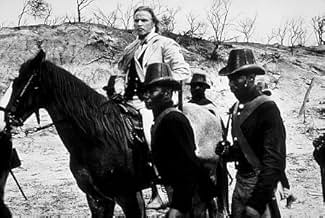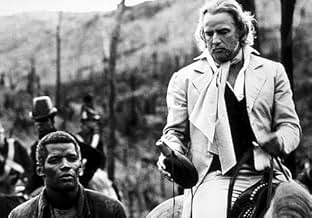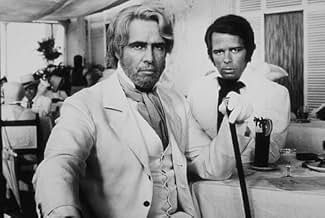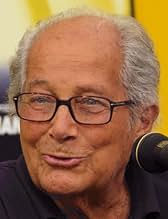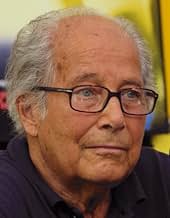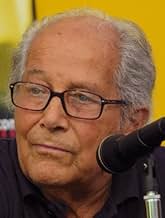Durante una rivolta degli schiavi nel 1844, un mercenario britannico aiuta un'isola coloniale delle Antille a ottenere l'indipendenza dal Portogallo. Anni dopo torna lì per cacciare all'uomo... Leggi tuttoDurante una rivolta degli schiavi nel 1844, un mercenario britannico aiuta un'isola coloniale delle Antille a ottenere l'indipendenza dal Portogallo. Anni dopo torna lì per cacciare all'uomo ed ex amico, capo dell'esercito ribelle locale.Durante una rivolta degli schiavi nel 1844, un mercenario britannico aiuta un'isola coloniale delle Antille a ottenere l'indipendenza dal Portogallo. Anni dopo torna lì per cacciare all'uomo ed ex amico, capo dell'esercito ribelle locale.
- Regia
- Sceneggiatura
- Star
- Premi
- 5 vittorie e 1 candidatura in totale
- José Dolores
- (as Evaristo Marquez)
- Juanito
- (as Joseph P. Persaud)
- Soldier
- (as Alvaro Medrano)
- Engl. Major
- (as Alejandro Obregon)
- Lady Bella
- (non citato nei titoli originali)
- Man on the ship
- (non citato nei titoli originali)
- Ramón
- (non citato nei titoli originali)
Recensioni in evidenza
"Burn" begins in 1845 as Sir William Walker (Brando) arrives on the island of Queimada, truly as far as can be judged as a harmless traveler but actually an agent of the British government ordered to incite a revolution that will shatter the Portuguese control on the island and permit the British to put their hand on the valuable sugar-cane total product Queimada has a population of two hundred thousand, of whom only five thousand are Europeans The main town is a well-protected port with a fort and a garrison, a governor's palace, a cathedral, a bank, a hotel and a brothel
The English gentleman recognizes he must play the part of a political Pygmalion He looks around for a suitable subject to train as a revolutionary and he selects José Dolores (Evaristo Marquez), a large, handsome black dock-worker with an air of confidence Walker also recruits Teddy Sanchez (Renato Salvatori), an almost-white clerk with political ambitions Walker persuades José Dolores to steal the bank of the island, and once he does, Walker reveals his name to the government, thereby turning Dolores into a hunted bandit The ingenious Walker then teaches Dolores and his followers in the use of firearms and gradually absorbs in them ideas and feelings to overthrow the Portuguese government
The film is quite obviously political in tone, and is a passionate piece of propaganda in the anti-colonial struggle Brando's interpretation of Sir William Walker is apt to call up memories of his Fletcher Christian This is another Englishman, whose gentle speech and soft manners disguise with courage and determination Walker is not a villain but a cold, inflexible pragmatist with a hard work to accomplish
Small wonder this film disappeared quickly from American screens. It's a no-punches-pulled, heady stuff even for the rebellious 1960's. Brando was always an anti-imperialist, and I suspect this film amounted to the one he long hoped to make, despite many years of bad choices. The movie itself remains an insight into the ugly realities behind the dressed-up facade of history books, proxy armies, and cosmetic governments. And although, not Brando's best performance (dialects never brought out his best), the screenplay stands as a testament to a political conviction which, despite the early years of McCarthy red-baiting, never wavered and even smouldered to artistic heights during that same period. ( Disregard Leonard Maltin's characterization of the film as "muddled"-- his staff apparently failed to follow the twists and turns of the power struggle, which, despite Maltin's myopia, pursues a reasoned course on all sides.) Then too, catch up with the uncut European version if you can.
Ten years pass, and the sugar industry now requires peace and stability on Quemada. The continuing guerilla campaign by the dispossessed blacks is harming profits. The very same English adventurer is once more despatched to the island, this time to hunt down and eradicate the revolutionaries he created.
Marlon Brando plays Sir William Walker in his best Fletcher Christian English accent and a blonde wig with a life of its own. His is a thoughtful performance, putting across the complexity of the man, a character who is undoubtedly cynical and unscrupulous, but who is also an emotional man and something of a political philosopher. He is certainly effective at what he does.
The direction of Gillo Pontecorvo is somewhat erratic at times. There are points where the narrative is confused, and the gold robbery which drives the plot somehow got left on the cutting-room floor. Jose Dolores' rise to power is the most significant event in the story, but we see nothing of it. During the voodoo carnival, two of the participants are wearing 20th-century soccer shorts. The film's central pivot, the passage of ten years between Walker's two visits to the island, is handled very sketchily by means of a few incongruous London scenes and a voice-over narration.
But there are good things, too. When Santiago's widow hauls her husband's body away, the masonry of the fort stands as a silent metaphor of colonial power - harsh, overbearing and sterile. Brando has some fine speeches, musing on the nature of political legitimism. The fire scenes are visually arresting (though it would have sufficed to have two or three guerillas being shot as they emerged from the burning sugar cane: seven or eight is labouring the point), and Walker is positively luminous against the tortured black shapes of the charred forest, showing in symbolic form that this man thrives on the suffering of the blacks, and that destruction is his natural element.
Lo sapevi?
- QuizMarlon Brando once said this film contains "the best acting I've ever done."
- BlooperPortugal never had any colonies in the Caribbean. Its only American colony, Brazil, has no coast in the Caribbean.
- Citazioni
Sir William Walker: Gentlemen, let me ask you a question. Now, my metaphor may seem a trifle impertinent, but I think it's very much to the point. Which do you prefer - or should I say, which do you find more convenient - a wife, or one of these mulatto girls? No, no, please don't misunderstand: I am talking strictly in terms of economics. What is the cost of the product? What is the product yield? The product, in this case, being love - uh, purely physical love, since sentiments obviously play no part in economics.
[general laughter]
Sir William Walker: Quite. Now, a wife must be provided with a home, with food, with dresses, with medical attention, etc, etc. You're obliged to keep her a whole lifetime even when she's grown old and perhaps a trifle unproductive. And then, of course, if you have the bad luck to survive her, you have to pay for the funeral!
[general laughter]
Sir William Walker: It's true, isn't it? Gentlemen, I know it's amusing, but those are the facts, aren't they? Now with a prostitute, on the other hand, it's quite a different matter, isn't it? You see, there's no need to lodge her or feed her, certainly no need to dress her or to bury her, thank God. She's yours only when you need her, you pay her only for that service, and you pay her by the hour! Which, gentlemen, is more important - and more convenient: a slave or a paid worker?
- Versioni alternativeThe complete version of this film runs 132 minutes. A 112-minute version under the title "Burn!" was released in the USA and the UK.
- ConnessioniFeatured in Pontecorvo: The Dictatorship of Truth (1992)
I più visti
- How long is Burn!?Powered by Alexa
Dettagli
- Data di uscita
- Paesi di origine
- Lingue
- Celebre anche come
- Quemada
- Luoghi delle riprese
- Aziende produttrici
- Vedi altri crediti dell’azienda su IMDbPro
Botteghino
- Lordo Stati Uniti e Canada
- 431.817 USD
- Tempo di esecuzione
- 2h 12min(132 min)
- Colore
- Proporzioni
- 1.66 : 1


